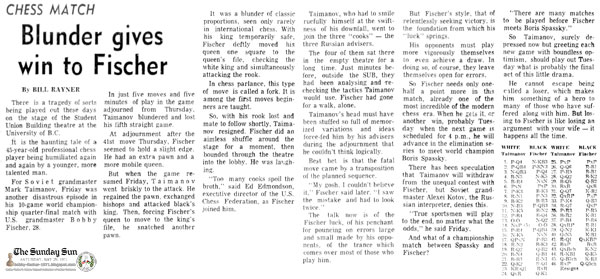The Vancouver Sun Vancouver, British Columbia, Canada Saturday, May 29, 1971 - Page 14
Chess Match - Blunder Gives Win To Fischer by Bill Rayner
There is a tragedy of sorts being played out these days on the stage of the Student Union Building theater at the University of B.C.
It is the haunting tale of a 45-year-old professional chess player being humiliated again and again by a younger, more talented man.
For Soviet grandmaster Mark Taimanov, Friday was another disastrous episode in his 10-game world championship quarter-final match with U.S. grandmaster Bobby Fischer, 28.
In just five moves and five minutes of play in the game adjourned from Thursday, Taimanov blundered and lost his fifth straight game.
At adjournment after the 41st move Thursday, Fischer seemed to hold a slight edge. He had an extra pawn and a more mobile queen.
But when the game resumed Friday, Taimanov went briskly to the attack. He regained the pawn, exchanged bishops and attacked black's king. Then, forcing Fischer's queen to move to the king's file, he snatched another pawn.
It was a blunder of classic proportions, seen only rarely in international chess. With his king temporarily safe, Fischer deftly moved his queen one square to the queen's file, checking the white king and simultaneously attacking the rook.
In chess parlance, this type of move is called a fork. It is among the first moves beginners are taught.
So, with his rook lost and mate to follow shortly, Taimanov resigned. Fischer did an aimless shuffle around the stage for a moment, then bounded through the theater into the lobby. He was laughing.
“Too many cooks spoil the broth,” said Ed Edmondson, executive director of the U.S. Chess Federation, as Fischer joined him.
Taimanov, who had to smile ruefully himself at the swiftness of his downfall, went to join the three “cooks” — the three Russian advisers.
The four of them sat there in the empty theater for a long time. Just minutes before, outside the SUB, they had been analyzing and rechecking the tactics Taimanov would use. Fischer had gone for a walk, alone.
Taimanov's head must have been stuffed so full of memorized variations and ideas force-fed him by his advisers during the adjournment that he couldn't think logically.
Best bet is that the fatal move came by a transposition of the planned sequence.
“My gosh, I couldn't believe it,” Fischer said later. “I saw the mistake and had to look twice.”
The talk now is of the Fischer luck, of his penchant for pouncing on errors large and small made by his opponents, of the trance which comes over most of those who play him.
But Fischer's style, that of relentlessly seeking victory, is the foundation from which his “luck” springs.
His opponents must play more vigorously themselves to even achieve a draw. In doing so, of course, they leave themselves open for errors.
So Fischer needs only one-half a point more in this match, already one of the most incredible of the modern chess era. When he gets it, or another win, probably Tuesday when the next game is scheduled for 4 p.m., he will advance in the elimination series to meet world champion Boris Spassky.
There has been speculation that Taimanov will withdraw from the unequal contest with Fischer, but Soviet grandmaster Alexei Kotov, the Russian interpreter, denies this.
“True sportsmen will play to the end, no matter what the odds,” he said Friday.
And what of a championship match between Spassky and Fischer?
“There are many matches to be played before Fischer meets Boris Spassky.”
So Taimanov, surely depressed now but greeting each new game with boundless optimism, should play out Tuesday what is probably the final act of this little drama.
He cannot escape being called a loser, which makes him something of a hero to many of those who have suffered along with him. But losing to Fischer is like losing an argument with your wife — it happens all the time.























